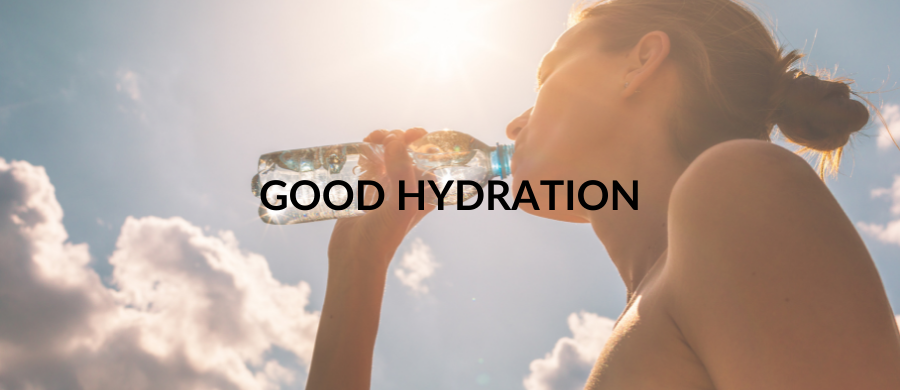Hydration – how much should we drink?

Good hydration is essential to ensure that all bodily functions are able to take place as normal. How much should we drink, what kind of drinks should we choose and what are the signs of dehydration?
Why do you need fluids?
Water in the body is essential for so many important processes to take place. From your blood system carrying essential glucose, oxygen and nutrients to cells, to the kidneys getting rid of waste products you no longer want. It also lubricates your joints and eyes, helps your digestive system function and keeps your skin healthy.
You are uniquely designed to regulate our own body temperature, particularly in hot conditions, by losing more water through the skin (perspiration), which in turn acts to cool the body helping to maintain a stable temperature. The more water you lose through sweat, the more you need to replace, so when the weather’s good, or you lose more fluid than normal doing sport the more you’ll need to drink.
Why do you need to keep hydrated?
Fluid is so important in the body that even when levels drop only slightly, you begin to feel the consequences. Low levels of fluid in the body can cause headaches, feelings of dizziness, lethargy, poor concentration and a dry mouth. Over a longer term, dehydration can cause constipation and can increase urinary tract infections and the formation of kidney stones.
How much do I need?
Adults need to drink around 1.5–2 litres of fluid a day. A typical mug or glass is about 200 millilitres (ml) so this equates to 8-10 drinks a day. Don’t forget that fluid needs can vary depending on various factors including level of physical activity and climate, so it is best to remember to drink regularly to keep thirst at bay. Remember to take a bottle of water with you when you go for a walk, to the gym, for a run or game of football or rounders and drink a little every now and then!
How do I know I’m drinking enough?
Simply waiting for the sensation of thirst is not a good enough sign of a need to drink – by the time you feel thirsty your body is already dehydrated and potentially suffering some of the effects. Equally, simply drinking to eliminate the feeling of thirst does not fully hydrate the body.
The best indicator of good hydration is urine colour, a pale straw coloured urine being a reliable indicator of good hydration. Darker coloured urine is a sure sign that the body needs more fluid. Getting into the habit of drinking regularly is a great way of keeping hydrated.
What drinks count?
Any drink will help to promote hydration. Water from the tap is a great choice, not least because it’s readily available and free. Other drinks count towards our total fluid intake too; milk, fruit juice, tea, coffee and soft drinks are all over 85% water and can be included in total fluid intake.
Some drinks contain other nutrients in addition to fluid such as sugars, fats, vitamins and minerals. Fruit juice is one such drink with vitamins, minerals and sugars too. A glass does contribute to fluid intakes and also provides one of the recommended five portions of fruit and vegetables. Don’t forget that the recommended portion is 150ml though, and only one glass of fruit juice counts each day.
Drinks with added cream and/or full fat milk provide more calories and higher fat intakes are not generally recommended within healthy eating guidelines, so drinks like creamy hot chocolates are best considered to be treats!
There has been confusion about coffee in particular, with some wrongly thinking it does not hydrate the body as it contains caffeine. Although caffeine is a mild diuretic, the fluid provided by a cup of coffee or tea far outweighs the mild dehydrating effect of caffeine and the fluid levels in the body are improved.
Most of the fluid we consume comes from drinks, but around 20–30% comes from foods. Fruit and vegetables such as courgettes, cucumber, tomatoes and melon are over 90% water and make a valuable contribution to our overall fluid intake.
Don’t forget
Good hydration is critical to health and keeps our bodies performing at their best, not only in terms of all the processes that go on but also keeping our levels of concentration up. The best advice is to keep a bottle of water close by to top up fluid levels regularly and keep thirst away.

Nigel Denby
Nigel Denby is an award-winning Registered Dietitian and has specialised in supporting women during the menopause transition for over 25 years. Nigel’s approach to nutrition and lifestyle advice is always practical. His motto is ‘No gimmicks, no fads and no quick fixes – just good, evidence-based nutrition’. Nigel Denby, BSc Hons, RD Registered Dietitian
@menopause_dietitian
Founder of www.harleystathome.com